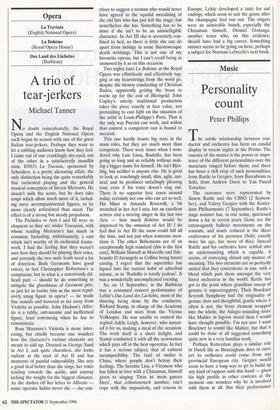Opera
La Traviata (English National Opera) La Boheme (Royal Opera House) Das Land des Ilichelns (Barbican)
A trio of tear-jerkers
Michael Tanner
No doubt coincidentally, the Royal Opera and the English National Opera each began its season with one of the great Italian tear-jerkers. Perhaps they want to let a sobbing audience know how they feel. I came out of one cracklingly dry-eyed, out of the other in a satisfactorily maudlin state. ENO's La Traviata, sponsored by Schroders, is a pretty alienating affair, the only distinction being the quite remarkably fine orchestral playing and the general musical conception of Steven Mercurio. He doesn't milk the score, but he does take tempi which allow much more of it, includ- ing mere accompanimental figures, to be more clearly articulated than usual. The effect is of a strong but steady propulsion. The Preludes to Acts I and III were as eloquent as they are under Toscanini, with whose reading Mercurio's has much in common. Including, unfortunately, a cast which isn't worthy of its orchestral frame- work. I had the feeling that they weren't sure how they should be playing their roles, and certainly the two male leads need a lot of direction. Both Germonts have good voices, in fact Christopher Robertson's is sumptuous; but in what is a notoriously dif- ficult part — should he do something to mitigate the ghastliness of Germont pare, or just let us loathe him as the most repul- sively smug figure in opera? — he made fine sounds and hovered as far away from Violetta as possible. John Hudson's Alfre- do is a tubby, unromantic and ineffectual figure, least convincing when he has to remonstrate.
Ross Mannion's Violetta is more inter- esting, but chiefly because one wonders how the character's various elements are meant to add up. Dressed as George Sand in Act I, and quite charmless, she looks radiant at the start of Act II and has moments of painful vulnerability. She acts a good deal better than she sings, her voice tending towards the acidic, and anyway lacking the weight for the biggest climaxes. As she dashes off her letter to Alfredo some operatic habits never die — she con-
trives to suggest a woman who would never have agreed to the squalid moralising of the old fart who has just left the stage; but nonetheless she has. Something has to be done if she isn't to be an unintelligible character. In Act III she is accurately con- fined to bed, so there is little she can do apart from indulge in some Barstowesque death writhings. This is not one of my favourite operas, but I can't recall being as unmoved by it as on this occasion.
Two nights later La Boheme at the Royal Opera was effortlessly and effectively tug- ging at my heartstrings from the word go, despite the blowsy conducting of Christian Badea, apparently getting the brass to warm up for the end of Rheingold. John Copley's utterly traditional production takes the piece exactly at face value, not pretending to cast light on the situation of the artist in Louis-Philippe's Paris. That is the only way Puccini can work, and within that context a competent cast is bound to succeed.
This one hardly boasts big stars in the main roles, but they are much more than competent. There were times when I won- dered why Luis Lima, Rudolfo, has been going so long and so reliably without mak- ing a bigger name for himself. He isn't Bjor- ling, but neither is anyone else. He is good to look at, touchingly small, slim, agile, nat- ural; and he produces unfailingly pleasing tone even if his voice doesn't ring out. There is no superior lyric tenor around today, certainly not one who can act so well. His Mimi is Amanda Roocroft, a bit stretched in her Act I aria, but an excellent actress and a moving singer in the last two Acts — how much Boheme would be improved by the omission of Act II! I do feel that in Act III the snow could fall all the time, and not just when someone men- tions it. The other Bohemians are of an exceptionally high standard (this is the first cast), William Shimell as Marcello and Ilde- brando D'Arcangelo as Colline being luxury casting. I regret that the supertitler has lapsed into the current habit of adverbial misuse, as in `Rodolfo is totally jealous'. It was a wonderfully uncomplicated evening.
So, on 11 September, in the Barbican was a costumed concert performance of Lehar's Das Land des Liiehelns, most of the dancing being done by the conductor, Richard Stamp, in charge of the Academy of London and stars from the Vienna Volksoper. He was unable to control the reginal Adele Leigh, however, who narrat- ed it for us, making a meal of the occasion. The work itself is a sheer delight, and Stamp conducted it with all the seriousness which pays off in the best operettas. In fact it has a serious subject, that of cultural incompatibility. The land of smiles is China, where people don't betray their feelings. The heroine Lisa, a Viennese who has fallen in love with a Chinaman, himself given to singing 'Dein ist mein ganzes Herz', that echtwieneri.sch number, can't cope with the impassivity, and returns to
Europe. Lehar developed a taste for sad endings, which seem to suit the genre after the champagne had run out. The singers were an admirable bunch, especially the Chinaman himself, Otoniel Gonzaga, another tenor who, on this evidence, should have had a big career. Something sinister seems to be going on here, perhaps a subject for Norman Lebrecht's next book.


















































































 Previous page
Previous page